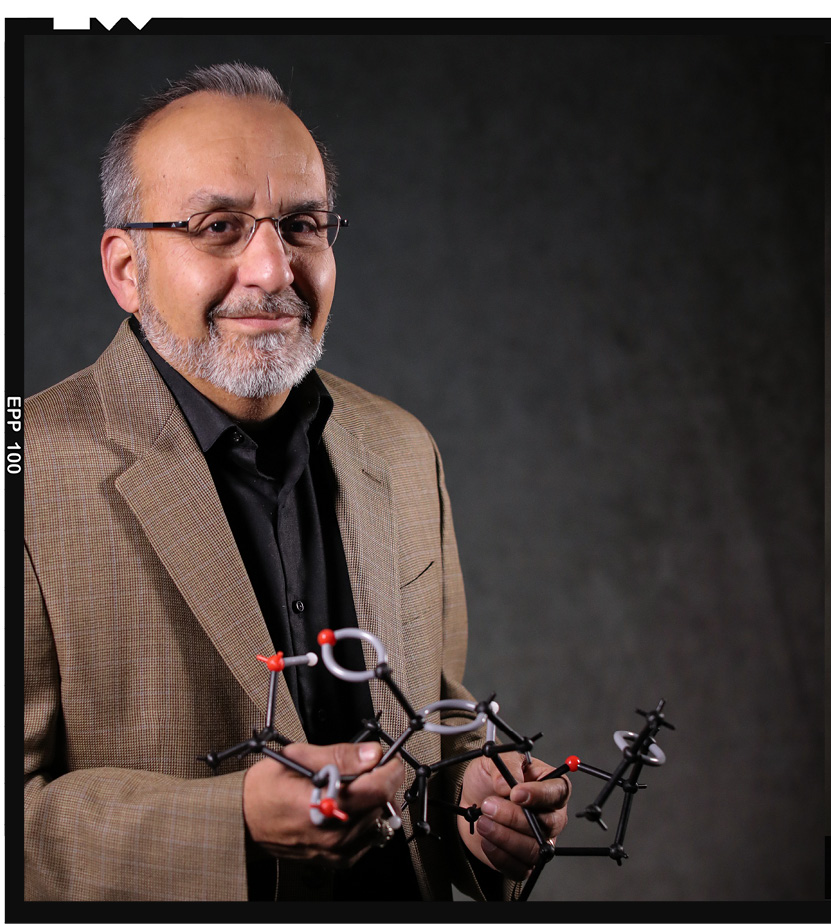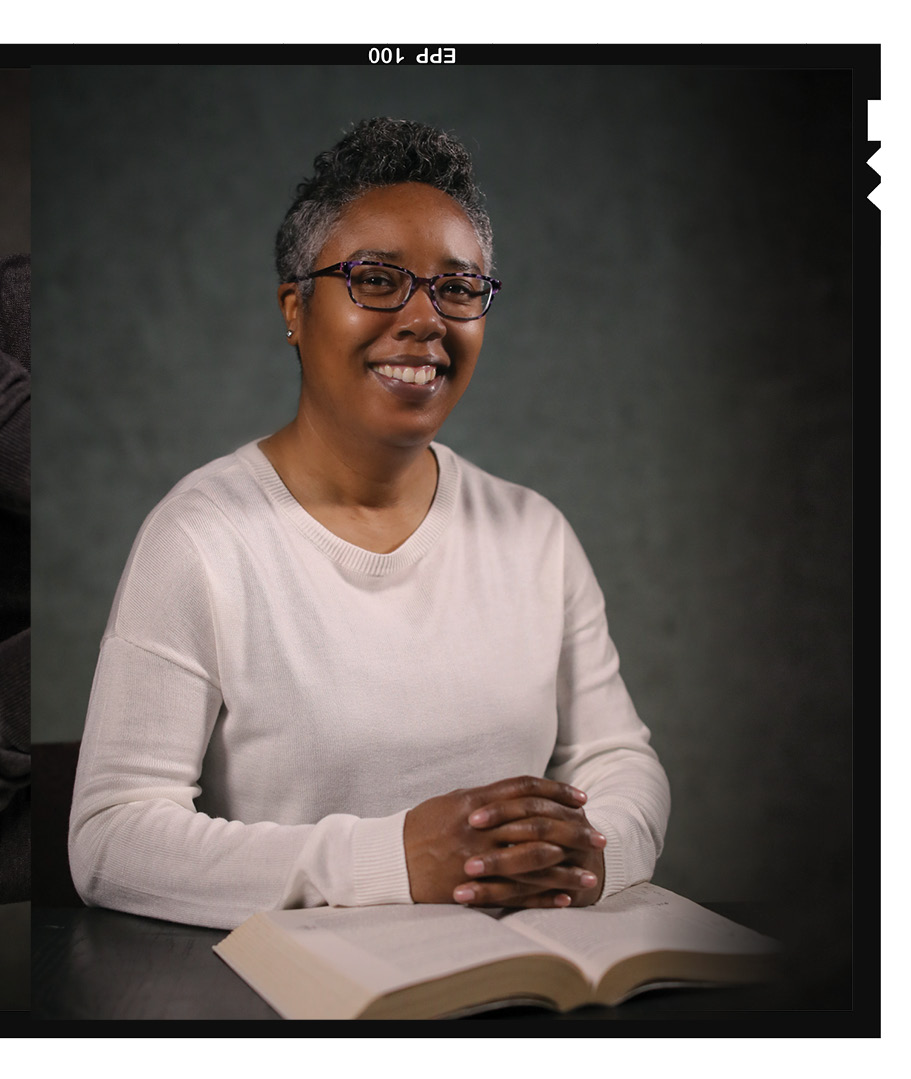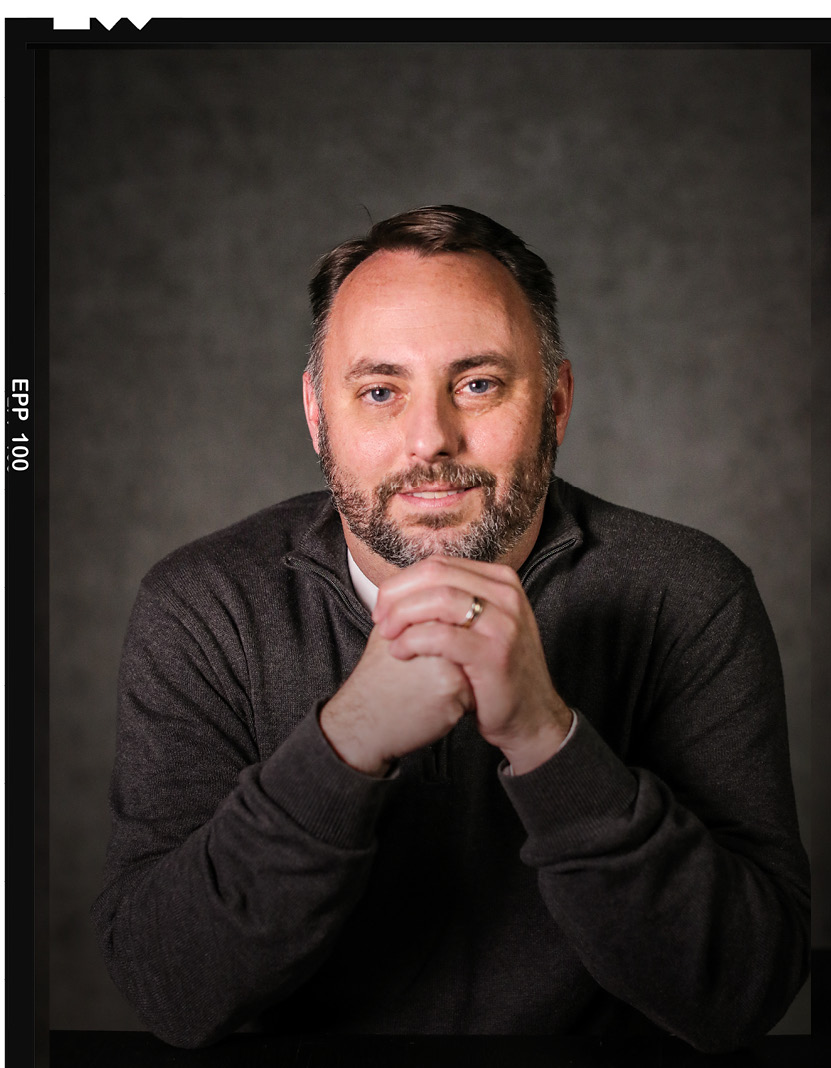Guiding the Way
Their paths and disciplines are varied, but the faculty who create Baylor's academic experience are united in purpose and calling
Many backgrounds, personalities and passions make up the mosaic that is the Baylor faculty. With more than 1,400 individuals dedicated to the instruction of Baylor students across 11 different colleges and schools, there are many outstanding scholars whose stories represent the heart of the Baylor experience.
Jason Whitt, B.A. ’96, Ph.D. ’08, wanted to attend a college away from home, but Baylor University was not on his radar. His father was a Texas Christian University men’s basketball assistant coach during Whitt’s childhood, and the family remained in Fort Worth thereafter. Because of this, Whitt did not necessarily want to attend a TCU rival. However, that soon changed.
“I visited Baylor and didn’t apply anywhere else after that,” Whitt says. “I knew this was the place for me.”
While on that visit, Whitt had the opportunity to attend a mock lecture by former Baylor President Robert B. Sloan, who at the time was the inaugural holder of the George W. Truett Chair of Evangelism. It was this experience that confirmed Baylor as his future alma mater.
“I thought, ‘If you can study this stuff at a college, I’m ready to be there,’” Whitt says.
Nearly three decades later, Baylor remains the place for Whitt. He earned a Master of Divinity from Southwestern Baptist Theological Seminary before returning to Baylor for his doctorate. In 2018, Whitt was named Senior Lecturer in the Honors Program, following nearly a decade as associate director of Baylor’s Institute for Faith and Learning and as an adjunct faculty member in the medical humanities program.
“I felt called to ministry at the end of high school,” Whitt says. “I still see everything I do through my call to ministry. My work is at the intersection of medicine and faith.”
Whitt, who is an ordained Baptist minister, teaches medical humanities courses and coordinates the annual Baylor Medical Ethics seminar for physicians, administrators and other healthcare professionals. He is co-director of the
William Carey Crane Scholars Program and a faculty mentor for the student organization Christian Pre-Health Fellowship.
The mock lecture during Whitt’s visit to Baylor cemented his decision on where to attend college. The spirit of that experience continues to shape why he is a Baylor faculty member today and how he influences the students in his care.
“I saw in that mock lecture that Baylor was asking questions that I really wanted to ask about life, scripture and theology,” Whitt says. “As an undergraduate, I couldn’t believe I was around so many incredible men and women of character, faith and courage — the students and faculty. That’s what drew me here and kept me here.
“Now, my students are the same men and women of incredible character who want to serve others and have their lives count for something. Many of my colleagues were drawn here for the same reason, to be around people of character.”
And not all of Whitt’s colleagues who fall into that category are Baylor graduates. Some, like Whitt, had deep roots to a “rival” university but found something special, something deeply significant at Baylor. It informs them personally and professionally as they exemplify the University’s mission to “educate men and women for worldwide leadership and service by integrating academic excellence and Christian commitment within a caring community.”
Teaching Tomorrow's Teachers
Brooke Blevins, Ph.D., earned bachelor’s and master’s degrees from San Antonio’s Trinity University and her doctorate from the University of Texas at Austin. Despite not having a Baylor background before joining the University in 2011, Blevins, like Whitt, felt called to Waco.
“I’d interviewed several places, but I remember after talking with Baylor thinking, ‘Can that place be as good as it sounds on the phone,’” Blevins says. “I came to campus for an in-person interview and knew when I left this was the place I wanted to be. It was an unprecedented feeling I’d had about any institution.”
An associate professor, Blevins has been the Conwell G. Strickland Endowed Chair of the Department of Curriculum and Instruction in the School of Education since 2019. She teaches undergraduate and graduate courses in secondary education, social studies education and multicultural education.
Blevins was struck by the depth of compassion and caring spirit she found at Baylor. She remembers being asked how her faith informs her work during her Baylor interview more than a decade ago. It was a refreshing question.
“My faith has always motivated and animated the work I do, but no one had ever asked me that question,” she says. “Also, the congeniality at Baylor and in our department is what makes this place so special. I felt that on my first visit to campus — these people like each other and this place. There’s something contagious about that. And that was not present at other campuses I visited.”
“I came to campus for an in-person interview and knew when I left this was the place I wanted to be.”
Education has always been in Blevins’ blood; both of her parents worked in education. She is a former secondary teacher, and she is passionate about equipping teachers with the resources needed to engage in humanizing social studies education.
As co-director of the iEngage Summer Civics Institute, Blevins and co-founder Karon LeCompte, Ph.D., have raised more than a quarter-million dollars in grant funding. Her research focuses on social studies education as a means to prepare active and engaged citizens. Blevins examines how to prepare teachers to develop political clarity and pedagogical content knowledge that encourages them to engage in transformational-based and humanizing social studies education.
“I still love the classroom, but I realized that I could have a broader impact in teacher education — teaching teachers,” she says. “My current role is the next level to that, helping lead people who are teaching teachers and thinking about education at large.”
A New Family
San Antonio native Daniel Romo, Ph.D., had a passion for chemistry from a young age and took every chemistry class he could in high school. He attended Texas A&M University, where he majored in chemistry and biology. Romo earned his doctorate from Colorado State University, followed by a two-year stint as an American Cancer Society Post-Doctoral Fellow at Harvard University.
In 1993, Romo joined the Texas A&M faculty and began a lustrous career at his alma mater. He was named director of the university’s Natural Products LINCHPIN Laboratory in 2010 and director of A&M’s Undergraduate MiniPharma (a program that gives students a glimpse into the work of the pharmaceutical industry) the following year.
Therefore, it came as a surprise to many in College Station that Romo left his alma mater for a “rival” university, where he is the Schotts Professor of Chemistry in the College of Arts & Sciences.
“There was a need for me to find a university department where there were other like-minded synthetic chemists,” Romo says. “Getting good graduate students is the lifeblood of any research program, and we were having problems doing that at A&M.”
John L. Wood, Ph.D., is the Robert A. Welch Distinguished Professor and the Cancer Prevention Research Institute of Texas (CPRIT) Scholar in Baylor’s chemistry and biochemistry department in the College of Arts & Sciences. Romo and Wood were simultaneously Harvard postdoctoral fellows and developed a friendship at that time.
It was Wood who wooed Romo to Waco.
“I knew together we could recruit some really good graduate students, and that certainly has been the case,” Romo says. “But when I started the interview process and saw the Baylor Sciences Building, I was blown away. The facilities there to do research were amazing. And the colleagues that I met, the congeniality was very evident; that certainly was attractive.”
“The connection between research and teaching cannot be overlooked.”
Romo brought his LINCHPIN Laboratory and combined it with a similar lab Wood was in the process of beginning at Baylor. They formed the CPRIT Synthesis and Drug-Lead Discovery Laboratory, of which Romo is co-director.
“It was somewhat like marrying into a new family,” Romo says of his transition to Baylor. “People at A&M thought I would never leave, but it was time. It was time to refresh.”
Romo is indicative of the caliber faculty Baylor aims to attract in its R1/Tier 1 pursuit as outlined in Illuminate, the University’s strategic plan. While his research credentials are unquestionable, Romo’s passion equally resides in the classroom.
“I get more juiced up and excited about teaching because there are times when I can interject some of the things we’re doing in my lab,” he says. “I know the students appreciate that because I hear it in the evaluations at the end of the semester. I want to share the enthusiasm I have for the subject with my students.”
Romo says there is a marriage between research and teaching, which includes work done in the laboratory. He works with graduate and undergraduate students in Baylor’s MiniPharma program, a combination of the Romo Research Group and the CPRIT Lab.
“Whether we’re teaching in the classroom or we’re teaching in the laboratory, it’s all teaching,” Romo says. “The connection between research and teaching cannot be overlooked, and it’s very clear to me.”
Romo finds fulfillment in helping students realize their academic and professional passion through the teaching process.
“I start my class by telling students, ‘You’ve heard the horror stories of organic chemistry, but I’m here to tell you that doesn’t have to be true,’” he says. “I try to make it a more logical approach that builds on itself. I get the most fulfillment from students who are not necessarily going into organic chemistry or graduate school who come out of the class liking organic chemistry.”
Another of Romo’s passions is reaching others for Christ. He admits a sense of trepidation about coming to Baylor in that he would have less interaction with non-believers, but he realized it as an opportunity to transition from witnessing to discipleship.
“What I’ve enjoyed at Baylor is the comfort students feel in coming to me with family or other issues,” he says. “I’ve been able to say, ‘Let’s pray together and see if God can lead us on this.’”
Romo says his transition to Baylor has been personally and professionally rewarding.
“The collegiality we have in the department has been wonderful,” he says. “The research has been propelled in some extent, and I’ve been blessed that our research funding has continued and probably increased. It’s been a great move for me, my research group and my family.”
Respect, Kindness, Grace
When Coretta Pittman, Ph.D., was an undergraduate student at Austin State Peay University in Clarksville, Tennessee, she found it difficult to develop a strong rapport with professors in her major. She finds a different scenario as a professor at Baylor.
“Sometimes, I find mentoring students to be more rewarding than being in the classroom,” Pittman says. “Baylor students are really smart, but they can be shy. I encourage them in the classroom to express themselves and be who they want to be. When they come by my office, they are themselves, and I enjoy that relationship. I didn’t have that as an undergraduate, and I longed for it.”
Pittman, an associate professor in Baylor’s English department in the College of Arts & Sciences, teaches courses in advanced expository writing and rhetorical theory. Her research examines the social and cultural importance of language.
“Most of the work focuses on teaching students how language defines who we are as human beings,” Pittman says. “Sometimes, it’s very complicated and often has been wrong. We parse out how a particular text misinforms us about these kinds of people.”
Pittman appreciates that she is able to have deep, complicated, sensitive conversations with students in both first-year writing and advanced writing classes. She believes this is a hallmark of and exemplifies the importance of a liberal arts education.
“Sometimes, I find mentoring students to be more rewarding than being in the classroom.”
“I try to present students with a broad array of writers from around the world who are invested in questions about place and identity,” she says. “Students typically are on board because they understand those concerns.”
One of Pittman’s mentors in graduate school at Austin Peay graduated from Baylor. However, Pittman did not know this until applying for her current position at Baylor after completing her doctorate at Detroit’s Wayne State University.
“I happened to mention on the phone that I was applying to Baylor, and she said, ‘Wait a minute; that’s where I went for undergrad.’ I had no idea,” Pittman says. “She told me I had to go to Baylor. She was my connection, but I didn’t know it until that moment.”
Many things about Baylor appealed to Pittman, including that she was ready to get out of the cold winters through which she’d lived in Detroit and while on a doctoral fellowship at a college in Upstate New York. She loved Waco’s size and Baylor’s campus. One factor, however, outshone all others.
“It was the people I met who are now my colleagues and how they talked about their students,” she says.
Pittman, who grew up in Baptist and Methodist churches, says both her teaching and her faith are focused on justice issues.
“I try to treat students with respect and kindness. I give students grace, and I hope they give me grace,” she says. “I’m not a perfect person, but I strive to do good work and be a decent human being. My faith very actively informs how I teach, what I teach and how I treat my students, even on my worst days.”
Compassionate Community
Nearly two decades after his first visit to Baylor and hearing questions being asked that piqued his interest, Whitt began asking questions about medicine and what it means to be a human. This occurred after his daughter Camille was born with severe neurological impairment. It has shaped who he is as a teacher.
“My great passion now is forming our pre-med students intellectually, morally and spiritually before they go into medicine,” Whitt says. “They will be asked these questions in medical school, and we can help them be prepared. We might be learning about the backgrounds of Christian spirituality in medicine, but I also want them to think about the kind of person they want to be in medicine. They must be people of courage and conviction to make this matter at all.”
Whitt is also the Honors College Faculty Steward, a faculty-in-residence role that connects the residential experience to the life of the mind and broader university academics. Faculty stewards participate in student development by fostering scholastic pursuit and the formation of personhood best accomplished by life in a community of friends.
“My great passion now is forming our pre-med students intellectually, morally and spiritually.”
“I’m thrilled to walk through life with students every day,” Whitt says. “They are in one of the most informative periods of their lives, and it’s a privilege to be a part of that. I hope they see in my family what it is to love each other. We invite them to grow with us and sometimes grieve with us.”
It is not a one-way street. Whitt and his family nurture the students they serve, but those students also minister to the Whitt family. Such was the case in January when Whitt endured the death of his father and his 11-year-old daughter Camille within a three-day span.
“This community of students has come around us and upheld us,” Whitt says. “They’ve sent notes, prayers, cards. I’m blessed to extend my family to all these students. I’m blessed to get to know these students. And I’m blessed to be at Baylor.”



